Ten years ago the pottery-based economy of the town of Yingge (
The central government was then called upon to devise ways to prevent the nation's leading ceramics-manufacturing town from receding unnoticed into history. The Tourism Bureau declared the town a national cultural site and set about promoting Yingge as a must-see for local and foreign tourists alike. At the same time, the Yingge township and Taipei County governments began looking into ways to develop the town as a tourist attraction while preserving its unique character.
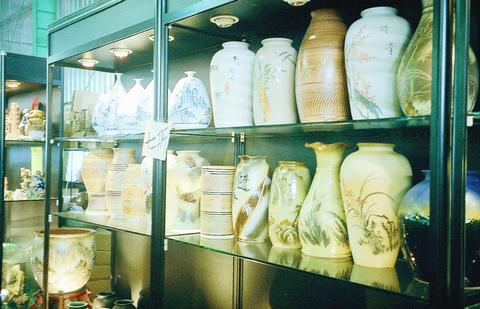
PHOTO: GAVIN PHIPPS, TAIPEI TIMES
Located at the southernmost tip of Taipei County, Yingge put itself on the map in 1805 when huge clay deposits were discovered in the surrounding hillsides. The town's economy gradually shifted from agriculture to clay mining and ceramics over the next 100 years. By the 1940s, Yingge had become the center of the island's ceramics manufacturing industry, with its goods being exported around the world.
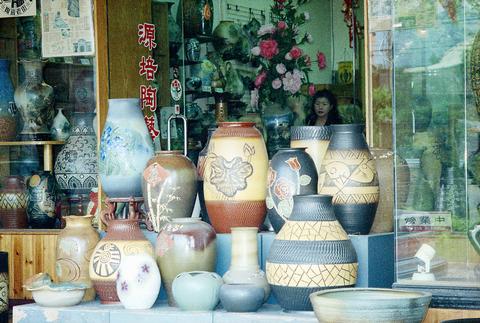
PHOTO: GAVIN PHIPPS, TAIPEI TIMES
A new chapter in Yingge's development opened with the completion of a pedestrians-only zone called Old Pottery Street (
Incomplete planning
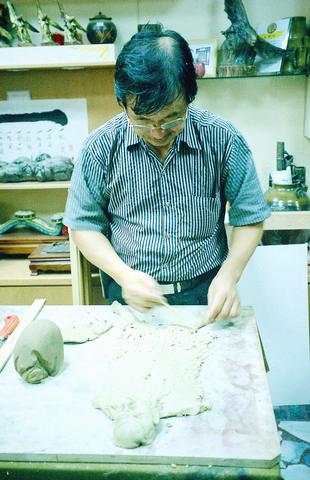
PHOTO: GAVIN PHIPPS, TAIPEI TIMES
Completion of the tourist infrastructure projects and its attendant increase in visitors to the town hasn't pleased all of Yingge's ceramics makers, particularly those who weren't on the map of the redrawn pedestrian's-only zone.
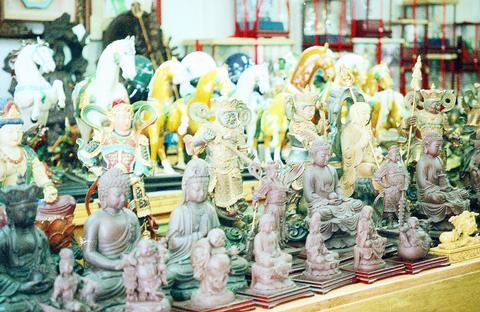
PHOTO: GAVIN PHIPPS, TAIPEI TIMES
Craftsman Lu Rong-ho (
The artist, who moved to Yingge five years ago, used to make over NT$50,000 on an average day. More recently, however, his business has sunk to about NT$20,000 on a good day.
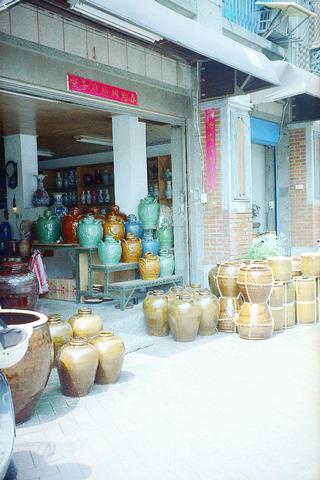
PHOTO: GAVIN PHIPPS, TAIPEI TIMES
"Look outside my store on weekends and there'll be cars double- and even triple-parked. Visitors don't come to my store. They head straight for the nice traffic-free environment of the pottery street."
Lu does not begrudge people's choice to visit the pottery street, but resents what he perceives as a lack of a thorough plan to include businesses not in the pedestrians-only zone and in particular the lack of parking facilities.
"It's incredible. The [pedestrians-only] street and museum were meant to improve business at the ceramics stores in Yingge, but the way nobody appears to have remembered to build car parks to deal with the predicted influx of visitors is hard to believe."
At present there are only three car parks in Yingge, none capable of holding more than 100 automobiles.
Tony Hsu (
"At present I'd say about 60 percent of the visitors to Yingge come by train. We'd like to see this percentage increase. We'll be opening a new train station at the end of the lunar year and new car parking facilities are being looked into," Hsu said. "We understand that some storeowners are losing business because of the state of the town, but it's going to cost a lot of money and take a lot of time to do what needs to be done before everyone is satisfied."
According to Hsu, there are plans to extend Taipei's Mass Rapid Transit system as far as Yingge by 2010. But members of the local pottery community hope to see major changes in Yingge's horrible traffic situation long before then.
Winners and losers
On Old Pottery Street, up the road from Lu's store, the reaction to the changes is drastically different.
"Since the street was completed my business has boomed. A few years ago I'd get maybe 50 customers on a good day. Now I get over 100 on any given day," explained Shen Tien-si (
"With business as it is, I certainly have no complaints."
Shen says the grievances of people like Lu are misplaced, and that any drop in sales is more likely due to the products on offer.
"The traffic has always been awful in the town, so to blame their economic woes on these conditions is stupid. It's more a question of economics rather than anything else. If they lowered their prices and sold the type of goods that are fashionable, then they'd probably sell more wares and attract more visitors," Shen said.
But following the market's whim has sparked bitter debate over the intrusion of crass commercial ceramics squeezing out local crafts. According to several local ceramics makers, traditional Yingge pottery is being pushed off shelves to make room for cheaper imported ceramics. Such products, they say, ensure an easy profit, but do nothing for Yingge's tradition in ceramics.
"It's a travesty," said Lin Teng-an (
Ceramics from China with Mickey Mouse or Pooh Bear designs now occupy the same shelf space as finely crafted local pieces in many of Old Pottery Street's stores. In others, imported goods outnumber locally produced ones, and more often than not, there are no labels to inform customers as to a work's origin.
"Over the past few years the number of stores has increased but the number of factories and craftsmen has decreased. To fill the void, storeowners have taken to importing cheap ceramics and passing them off as locally produced works," Lin said. "It is going to destroy the credibility of local craftsmen and storeowners."
Many of the storeowners, whose shelves are stocked with Chinese-manufactured gaudy ceramic reproductions of historical idols and cartoon characters declined to comment on the tensions that have arisen in the town. One elderly storekeeper, however, was happy to shed some light on why he now feels the need to stock imported ceramics and why he feels those opposed to such products lack economic sense.
"I'd say that about 80 percent of the stuff in my store is locally produced and the other 20 percent is imported from China," said T. K. Chuang (
According to Chuang, his sales have increased since the opening of the pedestrian thoroughfare. Unfortunately, however, a large majority of these sales are of ceramics manufactured in a Chinese factory and not by the hands of Yinnge potters.

Last week the story of the giant illegal crater dug in Kaohsiung’s Meinong District (美濃) emerged into the public consciousness. The site was used for sand and gravel extraction, and then filled with construction waste. Locals referred to it sardonically as the “Meinong Grand Canyon,” according to media reports, because it was 2 hectares in length and 10 meters deep. The land involved included both state-owned and local farm land. Local media said that the site had generated NT$300 million in profits, against fines of a few million and the loss of some excavators. OFFICIAL CORRUPTION? The site had been seized

Next week, candidates will officially register to run for chair of the Chinese Nationalist Party (KMT). By the end of Friday, we will know who has registered for the Oct. 18 election. The number of declared candidates has been fluctuating daily. Some candidates registering may be disqualified, so the final list may be in flux for weeks. The list of likely candidates ranges from deep blue to deeper blue to deepest blue, bordering on red (pro-Chinese Communist Party, CCP). Unless current Chairman Eric Chu (朱立倫) can be convinced to run for re-election, the party looks likely to shift towards more hardline

Sept. 15 to Sept. 21 A Bhutanese princess caught at Taoyuan Airport with 22 rhino horns — worth about NT$31 million today — might have been just another curious front-page story. But the Sept. 17, 1993 incident came at a sensitive moment. Taiwan, dubbed “Die-wan” by the British conservationist group Environmental Investigation Agency (EIA), was under international fire for being a major hub for rhino horn. Just 10 days earlier, US secretary of the interior Bruce Babbitt had recommended sanctions against Taiwan for its “failure to end its participation in rhinoceros horn trade.” Even though Taiwan had restricted imports since 1985 and enacted

The depressing numbers continue to pile up, like casualty lists after a lost battle. This week, after the government announced the 19th straight month of population decline, the Ministry of the Interior said that Taiwan is expected to lose 6.67 million workers in two waves of retirement over the next 15 years. According to the Ministry of Labor (MOL), Taiwan has a workforce of 11.6 million (as of July). The over-15 population was 20.244 million last year. EARLY RETIREMENT Early retirement is going to make these waves a tsunami. According to the Directorate General of Budget Accounting and Statistics (DGBAS), the